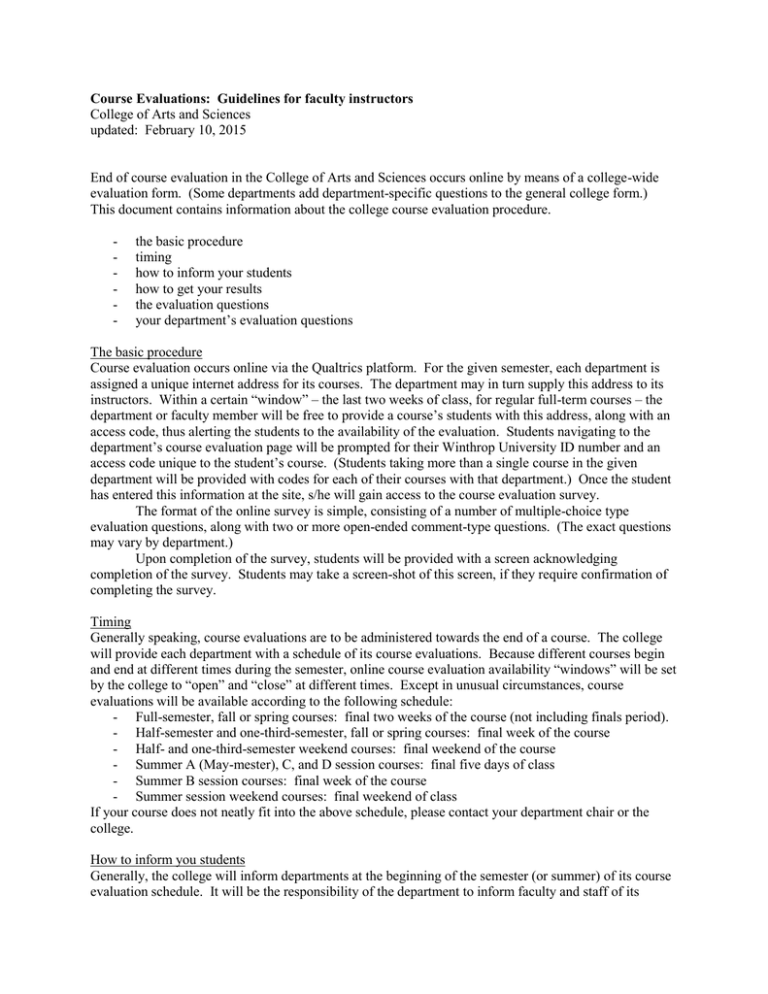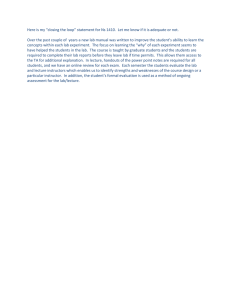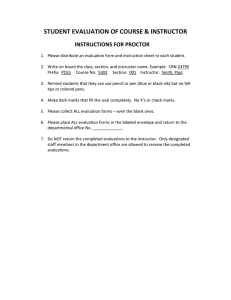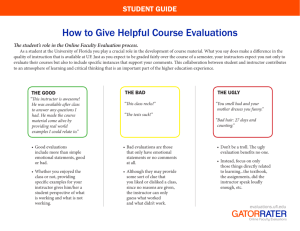Course Evaluations: Guidelines for faculty instructors
advertisement

Course Evaluations: Guidelines for faculty instructors College of Arts and Sciences updated: February 10, 2015 End of course evaluation in the College of Arts and Sciences occurs online by means of a college-wide evaluation form. (Some departments add department-specific questions to the general college form.) This document contains information about the college course evaluation procedure. - the basic procedure timing how to inform your students how to get your results the evaluation questions your department’s evaluation questions The basic procedure Course evaluation occurs online via the Qualtrics platform. For the given semester, each department is assigned a unique internet address for its courses. The department may in turn supply this address to its instructors. Within a certain “window” – the last two weeks of class, for regular full-term courses – the department or faculty member will be free to provide a course’s students with this address, along with an access code, thus alerting the students to the availability of the evaluation. Students navigating to the department’s course evaluation page will be prompted for their Winthrop University ID number and an access code unique to the student’s course. (Students taking more than a single course in the given department will be provided with codes for each of their courses with that department.) Once the student has entered this information at the site, s/he will gain access to the course evaluation survey. The format of the online survey is simple, consisting of a number of multiple-choice type evaluation questions, along with two or more open-ended comment-type questions. (The exact questions may vary by department.) Upon completion of the survey, students will be provided with a screen acknowledging completion of the survey. Students may take a screen-shot of this screen, if they require confirmation of completing the survey. Timing Generally speaking, course evaluations are to be administered towards the end of a course. The college will provide each department with a schedule of its course evaluations. Because different courses begin and end at different times during the semester, online course evaluation availability “windows” will be set by the college to “open” and “close” at different times. Except in unusual circumstances, course evaluations will be available according to the following schedule: - Full-semester, fall or spring courses: final two weeks of the course (not including finals period). - Half-semester and one-third-semester, fall or spring courses: final week of the course - Half- and one-third-semester weekend courses: final weekend of the course - Summer A (May-mester), C, and D session courses: final five days of class - Summer B session courses: final week of the course - Summer session weekend courses: final weekend of class If your course does not neatly fit into the above schedule, please contact your department chair or the college. How to inform you students Generally, the college will inform departments at the beginning of the semester (or summer) of its course evaluation schedule. It will be the responsibility of the department to inform faculty and staff of its particular procedure for alerting students to the availability of course evaluations. Generally, departments will provide faculty with the internet address for the department’s course evaluation, along with codes for the faculty members’ courses. It will in that case be the responsibility of the course instructor to provide his/her students with that information, so that the students may take the course evaluation at the desired time. Note that in general, this enables the instructor to determine when, during the availability window, students take the course evaluation. However, instructors and staff should consult with department chairs for the specifics of the department’s course evaluation procedure. How to get your results In general, the college will provide course evaluations to department chairs at the conclusion of the semester (or summer), after grades have been recorded. Department chairs will provide instructors with their course evaluations in due course. Please consult with your department chair for specific information on when and how course evaluations are distributed to instructors. The College questionnaire The questions general to the college course evaluation are reproduced below. Your Department’s survey questions If your department has its own course evaluation questions, these will be added by the college to the department’s course evaluation, as distributed via Qualtrics, above. Please consult with your department chair for information specific to your department’s own course evaluation questions. College Course Evaluation Questions The following questions use this response panel: Strongly agree/Agree/Neither agree nor disagree/Disagree/Strongly Disagree/Not Applicable 1. The course was what I expected based on the goals, objectives, and description provided early in the semester. 2. The course requirements (assignments, activities, explorations, readings, etc.) contributed to my understanding of course content. 3. The course required me to use critical thinking. Critical thinking goes beyond the learning of facts and is often demonstrated through activities that require synthesis of ideas, argument, logical reasoning, analysis, questioning, exploration, and/or problem solving. 4. As a result of my work in the course, I gained new knowledge, skills, information, and/or insights. 5. The instructor clearly stated the expectations for graded assignments and/or tests and followed them consistently. 6. The instructor provided useful feedback on my work. When evaluating the usefulness of feedback, consider the timeliness of response in relation to the type of assignment, the relationship to providing constructive comments that enabled you to develop further understanding, and the connection to assignment and/or course expectations. 7. The instructor created a classroom and/or online environment that was conducive to learning. The instructor welcomed questions and invited interaction. 8. The instructor was available outside the classroom and/or designated online class meetings (in selecting your rating, consider the instructor's availability via established office hours, appointments, and electronic communications). The following questions provide a space for open-ended student response: 9. What experiences in this course positively influenced your academic and/or professional development? Experiences to consider include (but are not limited to) assignments, discussions, internship placements, projects, labs, explorations, virtual activities, lectures, etc. 10. What, if anything, could the instructor do to improve this course?


